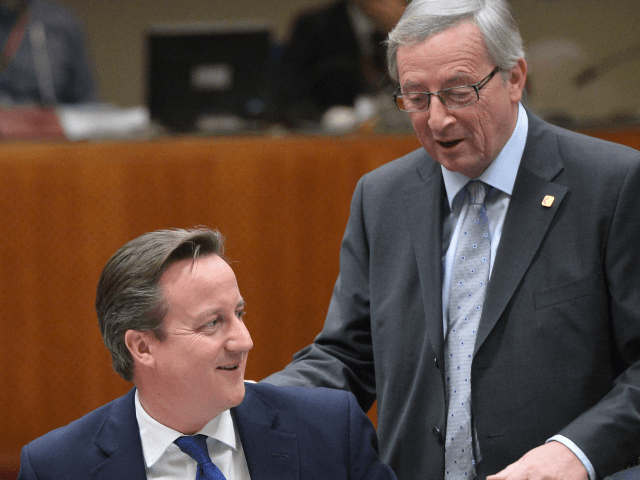The President of the European Commission, Jean Claude Juncker, has begun his public relations outreach to try and convince Britons to stay in the European Union (EU) with an article published in the increasingly pro-EU Times newspaper today. Mr Juncker’s article focuses heavily on the corporate, big business interests who will end up being the financial driving forces behind the Britain Stronger in Europe (BSE) campaign.
Last month Breitbart London reported that Mr. Juncker’s office has already set up a propaganda task force to convince Britons to vote to stay in the EU at the country’s referendum, expected in 2016 or 2017. Already we have seen Europhile members of the House of Lords attempting to sneak wrecking amendments into the EU referendum bill to allow for government propaganda to be distributed ahead of the vote. Now the might of the European Commission is intervening.
In the Times today, Mr. Juncker’s anti-Brexit article says:
We want to get Europe back to jobs and growth. Our investment plan for Europe uses EU funds to trigger €315 (£227) billion in private investments. The first projects are already up and running, and many more will come in the year ahead.
We want to make it easier for businesses to invest, especially for small firms and start-ups. A Capital Markets Union will make it easier to access finance from the capital markets — instead of having to rely just on banks.
We want fair corporate taxation, based on the principle that companies should pay taxes in the country where they generate profits. We will close loopholes between countries to make sure that all companies pay their fair share of tax. We will continue to act against companies that abuse “tax rulings” to avoid paying taxes.
We will remove obstacles on the internet, which will make it easier for British businesses to sell their products online throughout Europe — and for British consumers to shop where they like. We aim to build a fully functional digital single market within the next four years. Just today, the European parliament will vote on our plans to scrap roaming charges within the EU by 15 June 2017 — soon enough mobile phone users travelling within the EU will pay the same price as at home, with no extra charges.
His focus on corporations and taxation, with just one paragraph dedicated to the biggest issue in Europe at the moment – the migrant crisis – reveals that Mr. Juncker believes the battle will be fought and won on cash and economics.
He briefly mentioned the migrant crisis, stating that “There is no simple solution to this. And it is no more realistic to think that we could simply open our borders to all our neighbours any more than it is to think we just cordon ourselves off all distress, fear and misery. By promising to resettle refugees, and providing millions in extra funds, Britain is taking responsibility. But, collectively, we will have to do more.”
He concludes:
The commission’s approach is a pragmatic one. People will judge the EU by its ability to provide concrete solutions to the major challenges facing our societies today — and rightly so. That is what we are working to deliver.
We will use that same pragmatism when working on a renegotiation of the UK’s relationship with the EU. More than a year ago, when I campaigned to become president of the commission, I promised to seek a fair deal for Britain. That process has now begun. I will do this for one reason and one reason alone: because I believe that the EU is better with Britain in it and that Britain is better within the EU. And I believe that in key areas we can achieve much more by acting collectively than we could each on our own.
The Times newspaper supported David Cameron’s Conservative Party at the General Election, and has had at its heart in recent years the Conservative party peer Lord Finkelstein (Executive Editor), former Conservative Home editor Tim Montgomerie (Opinion Editor), and former Tory MP Matthew Parris (columnist).

COMMENTS
Please let us know if you're having issues with commenting.